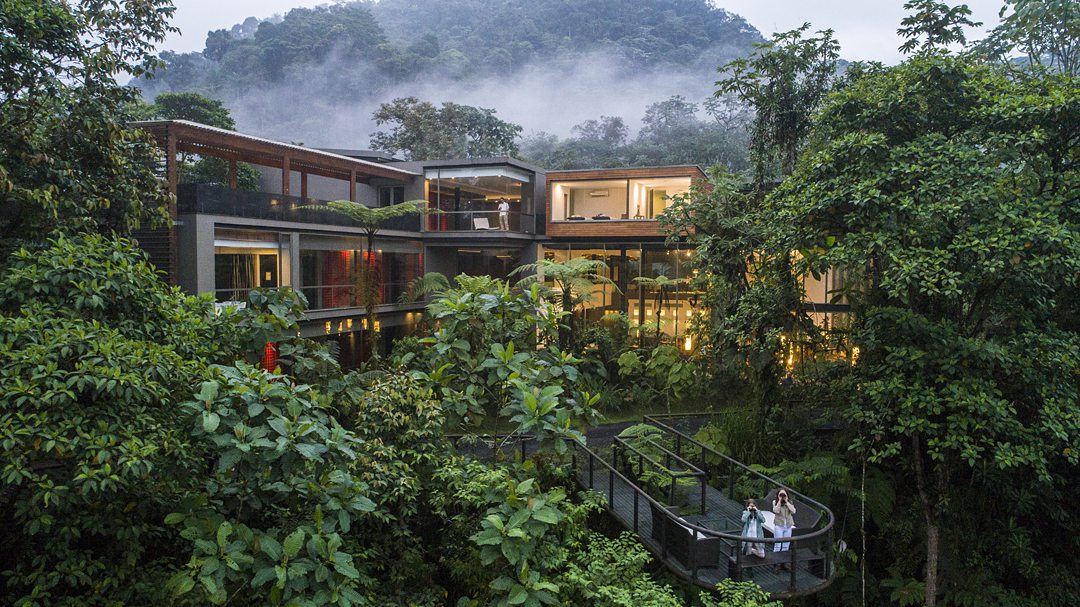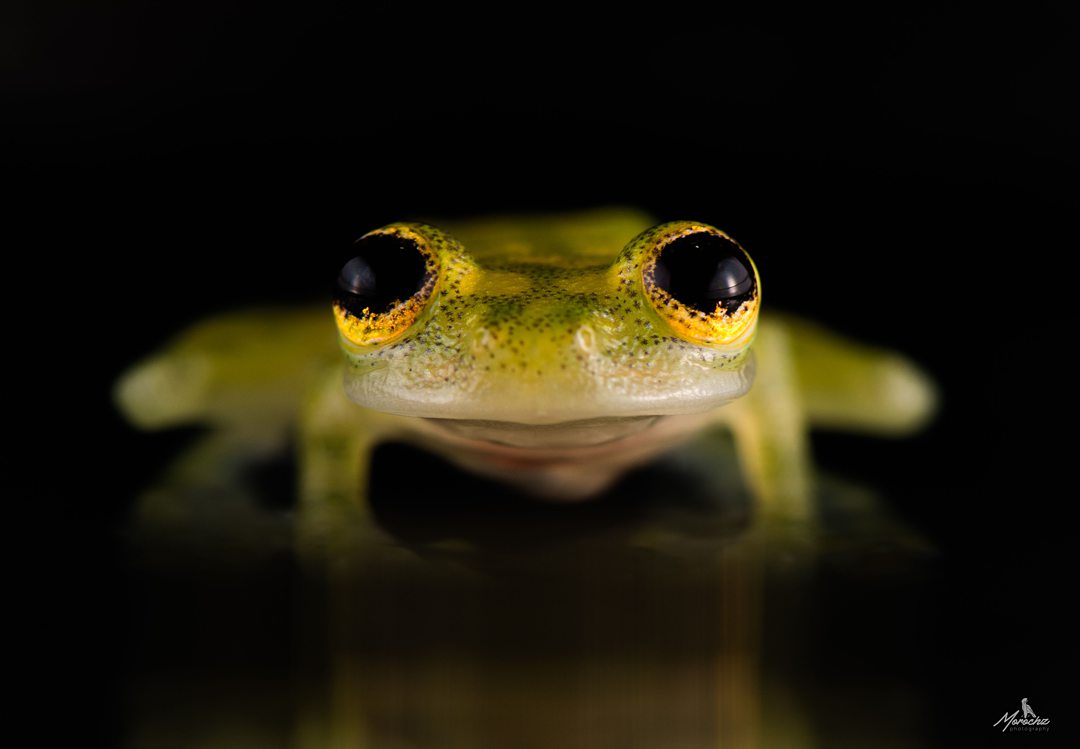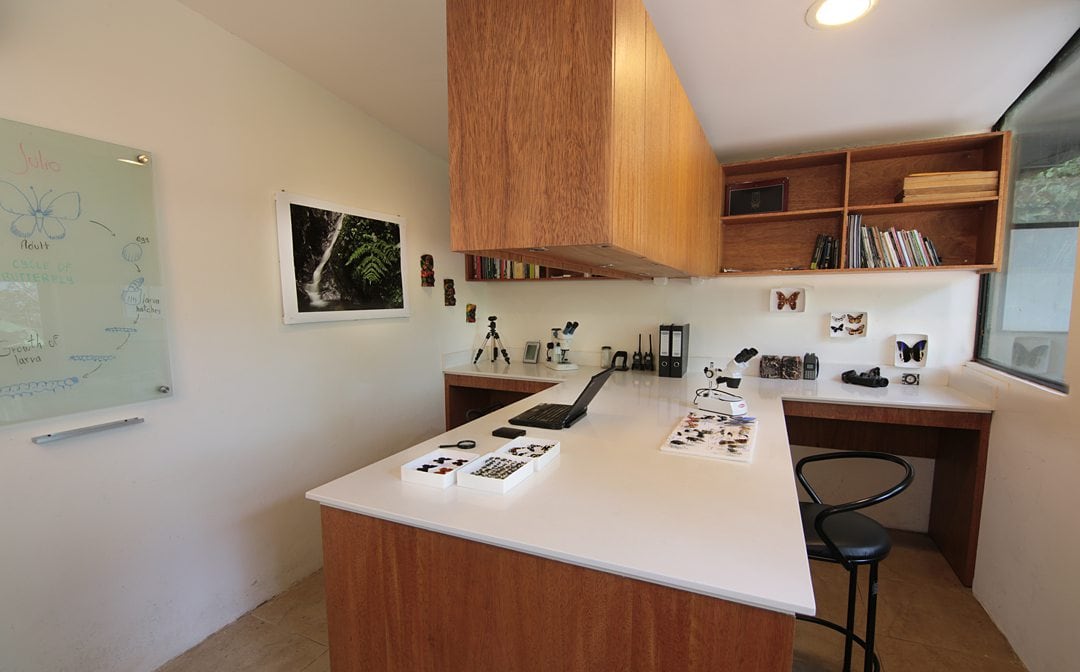Luxury Ecuador Eco-Lodge Where Guests Can Assist with Species Discovery
Ecuador, a country straddling the equator, is 1/35th the size of the United States. However, it has 20% more animal and plant species. Researchers at luxury Ecuador eco-lodge, Mashpi Lodge, have discovered several new species over the years, with their ninth and tenth new species discoveries announced this spring and summer, respectively.
Guests of the lodge can get involved in Chocó-Andean tropical forest conservation and know that their stay is financially contributing to a great cause.
Disclosure: There are affiliate links in this post, which means we may earn a small commission if you click the link and proceed with a purchase, at no cost to you. We truly only recommend hotels, products, and services we personally use. As Amazon Associates, we earn from qualifying purchases.

Mashi Lodge Is a 5-Star Ecuador Eco-lodge in the Clouds With a Purpose
Travelers visiting Ecuador have the opportunity to stay in a 24-room luxury eco-lodge a three-hour drive from the city of Quito, on Mashpi Rainforest Biodiversity Reserve, a 2,500-hectare (over 6,177 acres) protected area. It is part of the Chocó-Andean tropical forest, where guests are rewarded with the wonders of their incomparable surroundings and the hotel's magnificence.
Ecuadorian entrepreneur, Roque Sevilla, saw the property 13 years ago and envisioned a place where responsible tourism and scientific discovery intersect. He saved the old logging site from deforestation and built a destination for researchers and tourists alike who have a love for nature.
Research and preservation have always been fundamental pillars of why the lodge exists.
Ecuador is well known for its Galapagos Islands, which draws visitors from around the world to learn about the wonders and endemic species of the islands. But the biodiversity of inland and coastal Ecuador is equally (if not more) rewarding with its lush rainforest and countless species of flora and fauna.
New Species Discovered by Mashpi Lodge
The Ecuador eco-lodge has several resident researchers (parabiologists) and draws international scholars and environmentalists who come to Masphi to work in the reserve. Though identifying a new species takes time, including years of comparative research, Mashpi Lodge has discovered ten new species over the years, including two recent confirmations of a new frog and a new plant.
These discoveries help ensure that the diversity of species needed for the survival of all things in the rainforest goes unharmed and stays protected.
Intricate Fluidifolia Plant
A newly discovered epiphyte (plants that grow on other plants, like orchids and bromeliads) is unique in its leaf pattern. Instead of one sprout resulting in two equally-sized leaves on either side of the stem (like roses), Columnea fluidifolia sprouts two leaves of different sizes.
Expert botanist, Francisco Tobar, initiated a study after the unique plant caught his eye.
This new species is in the plant family, Gesneriaceae, the same family of violets. The plant’s flowers attract hummingbirds, who rely on the flowers for food. Its relationship with hummingbirds makes its preservation essential; it is on the critically endangered list.
Thanks to the researchers at Mashpi Lodge, who know the region's biodiversity well, they spotted this rainforest plant then spent years carrying out comparative studies on plants in nearby Costa Rica, Panama, and Columbia (where the Chocó bioregion extends) to ensure its singularity.
Mashpi Lodge's tenth species discovery was confirmed in July.
Mashpi Glass Frog
The ninth species discovered by Mashpi Lodge researchers was the Hyalinobatrachium mashpi glass frog, announced in April.
This tiny frog has a transparent belly that allows a viewer to see inside its body to its textured liver and heart. Measuring only three-fourths of an inch, spotting this amphibian requires astute awareness when traveling through the forest at night.
Mashpi Lodge researchers were hiking the tropical forest Amagusa River banks at night when their flashlights illuminated the small frog’s glass body.
This frog species usually hangs out in the treetops. The team was unable to confirm the frog’s identity thanks to the help of a local from the neighboring Pachijal community, Anderson Medina. He knew the biodiversity of the area like the back of his hand, which meant that it was perhaps a new species.
After a year of tracking this unidentified species, researchers recorded the frog’s call. This final piece confirmed their discovery.

How Guests Help Finance the Ecuador Eco-lodge’s Conservation Efforts
Guests' money paid to stay at the lodge helps Mashpi hire and accommodate resident researchers and supports its conservation efforts.
Additionally, their stays help fund the non-profit organization Fundacion Futuro, which aims to mitigate the effects of climate change. They work with local communities to conserve and manage the sustainability of the Chocó-Andean region.
Guests’ involvement with area activities also deepens their understanding and appreciation for the tropical forest and planet and aids in employing local experts and guides.
Mashpi Reserve Guests Get Entangled With the Tropical Forest
No matter a guest’s level of physical ability, they can partake in various activities at Mashpi Lodge. This allows them to be immersed in their surroundings and potentially see over 400 species of birds, trees, frogs, and more in the Chocó-Andean forest.
The examples below cover activities ranging from easy to high degrees of difficulty. And if a guest forgets his or her pair of binoculars, he or she need not worry – the property's boutique sells things like binoculars, raincoats, and even expedition-style pants. (Mashpi Lodge provides Wellington boots for all guest excursions.)
When guests return from a day trekking in the jungle, they can relax at Mashpi Lodge’s Samay Wellness Center.

Easy Mashpi Lodge Activities
Guests looking for an easy activity can simply meet a guide at the lodge at 6:00am. From there, head to the lodge’s terrace with high-powered binoculars and scopes for guided wildlife viewing, with coffee and cookies to boot.
Visiting the Research Laboratory is simply a walk to the lodge’s neighboring building. See eye-catching displays of insects there and better understand the research that regularly takes place.
Moderately Difficult Mashpi Lodge Activities
Experience a unique perspective of the tropical forest from high above its treetops after a short drive from the lodge to the Observation Tower. Climb 162 steps to view birds of prey soaring in the sky at 85 feet above ground level.
Head to the nearby Mashpi Torrenteer Lagoon, named after the endemic frog discovered there. Enjoy a small waterfall and search for tiny creatures – including glass frogs, caterpillars, and centipedes – as you explore the area with a guide.
Mashpi Lodge Activities With a High Degree of Difficulty
Guests with the fortitude to wake up at 3:00am and hike three hours into the tropical forest with flashlights are rewarded at daybreak. They have the chance to witness the mating rituals of a rare bird called Cock-of-the-Rock.
If guests crave more adventure, they can sign up for hiking to Glass Frog Falls. The expedition rewards hikers with the sounds of Howler Monkeys, spotting of Capuchin Monkeys, and pawprints of rainforest cats. Enjoying the falls at the end of the hike before heading back to the lodge is just as rewarding as the journey.

Conclusion
Guests of Mashpi Lodge, a luxury Ecuador eco-lodge in the heart of the Chocó-Andean tropical forest, can feel good about their stay. The money paid towards their experience and accommodations benefits the research and conservation of a fascinating and vital ecosystem on our planet.

